The 17th century English poet and playwright, remarkably one of the greatest wordsmiths that ever lived, must have penned the enduring lines with the likes of the political gladiator, inimitable party administrator and aficionado, Chief (Dr) Anthony Akhakon Anenih, the Iyasele of Esanland, in mind.
Anenih’s demise on October 28, 2018, at the age of 85, together with the surfeit of profound tributes that have trailed it, perfectly fits into Shakespeare’s contemplation and summation of death in its nuances.
Indeed, the observance of burial rites for Anenih is, essentially, a celebration of his life and times; and, it reminds us of how our shared humanity is daily discounted and the compelling obligation to always be ready for our respective exit.
John Donne put it succinctly in his Meditation XV11: “Any man’s death diminishes me, because I am involved in mankind, and therefore never send to know for whom the bell tolls; it tolls for thee.” Anenih’s death diminishes me. It diminishes many others whose paths crossed his and whose lives he touched with his eleemosynary acts.
The Iyasele defined his eon with the magnitude of his humanity and politics, a trade that he plied for about four decades, until that luminous epoch came to an abrupt end on that fateful Lord’s day. But he left his indelible imprints clearly stamped on the nation’s political landscape both as a strategist and tactician par excellence. His political exertions were quite incredible so much so that his associates and those in the other camps had different perceptions of his persona.
To his admiring loyal followers, Anenih was a leader who could be relied upon to attend to their socio-political and economic frailties and needs. But those in the other camps, acting in cahoots with their satellites in the media, successfully hung on him “Mr. Fix it”, a sobriquet he somewhat deprecated because of its connotative usage. But the conspirators succeeded in using it to denote their preconceived negative imageries and narratives about him.
That intersection, spanning three years, had also given him the opportunity to sort out so many other things, especially spiritual: rededicating his life to God, reconciling with those that he offended and those who offended him through unsolicited and unconditional forgiveness. A devout Catholic, it was very clear that he was prepared to meet with his creator, having run his race and completed his course.
A political icon, he remains a dependable leader, even in death, to his loyal political followers. To the best of his ability, he reciprocated their loyalty with greater loyalty and political rewards, which he selflessly dispensed. He was an apostle of “101 percent loyalty”; and, he was exemplary on that score.
His voyage into the nation’s cloak-and-dagger politics began in 1979 as a member and, subsequently, Chairman of the National Party of Nigeria (NPN) in the old Bendel State. He was instrumental to the victory of Dr. Samuel Ogbemudia as governor in 1982. At the time, he had just retired as Commissioner of Police and was tending to his successful private businesses.
It is important to underscore the pan-Nigerian outlook of Anenih’s politics, which made him detribalised. In 1982, he played a key role in the election of Alhaji Shehu Shagari as president for a second term, which was cut short by a military coup; in 1993, as National Chairman of the SDP, he led the presidential electioneering of the SDP that culminated in Chief MKO Abiola’s June 12 victory that was annulled.
At the level of pragmatic administrative savoir faire, Anenih, as Minister of Works and Housing from 1999 to 2002, availed Edo State his influence in government by repairing the critical Benin by-pass that has since greatly helped to ease the perennial traffic gridlock in Benin City. He also repaired the Benin-Asaba road and the Benin-Warri road.
A holder of many chieftaincy titles and honorary doctorate degrees from some Nigerian universities, the narrative of Anenih’s rise from grass to grace remains a source of inspiration to those who share with him similar socio-economic circumstances that he overcame in his quest for success in life, which God made possible through the right connection.
That was the soft side of the Anenih persona that was not known in its vastness to those who saw him as a tough-looking politician. Whereas, beneath the façade of his tough look, accentuated by his taciturn disposition, was a profound humanity that defined his life and act of philanthropy.
And as Chuk Palahniuk once said, “We all die. The goal isn’t to live forever; the goal is to create something that will.” His contemplation finds anchorage in Samuel Johnson’s rumination: “It matters not how a man dies, but how he lives. The act of dying is not of importance, it lasts so short a time.”
Chief Anthony Akhakon Anenih lived a good life. He lived for humanity. He lived for family. He lived for country and, above all, he lived for and honoured God with his substance. Adieu, great leader!
-
Ojeifo, Editor-in-Chief of The Congresswatch magazine, was media consultant to Chief Tony Anenih.
























Leave a comment